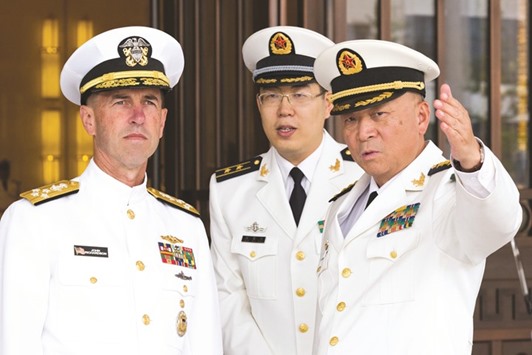Freedom of navigation patrols carried out by foreign navies in the South China Sea could end “in disaster”, a senior Chinese admiral has said, a warning to the United States after last week’s ruling against Beijing’s claims in the area.
China has refused to recognise the ruling by an arbitration court in The Hague that invalidated its vast territorial claims in the South China Sea, and did not take part in the proceedings brought by the Philippines.
It has reacted angrily to calls by Western countries and Japan for adherence to the decision.
China has repeatedly blamed the United States for stirring up trouble in the South China Sea, a strategic waterway through which more than $5tn of trade moves annually.
China, Brunei, Malaysia, the Philippines, Taiwan and Vietnam all have rival claims, of which China’s is the largest.
The United States has conducted freedom of navigation patrols close to Chinese-held islands, to Beijing’s anger, while China has been bolstering its military presence there.
Speaking behind closed doors at a forum in Beijing on Saturday evening, Sun Jianguo, an admiral and deputy chief of the Joint Staff Department of the powerful Central Military Commission, said the freedom of navigation issue was bogus and one that certain countries repeatedly hyped up.
“When has freedom of navigation in the South China Sea ever been affected? It has not, whether in the past or now, and in the future there won’t be a problem as long as nobody plays tricks,” he said, according to a transcript of his comments seen by Reuters yesterday.
China is the biggest beneficiary of freedom of navigation in the South China Sea and won’t let anybody damage it, Sun said.
“But China consistently opposes so-called military freedom of navigation, which brings with it a military threat and which challenges and disrespects the international law of the sea,” Sun said.
“This kind of military freedom of navigation is damaging to freedom of navigation in the South China Sea, and it could even play out in a disastrous way,” he added, without elaborating.
A US Defense official, speaking on condition of anonymity, said the United States reserved the right to carry out freedom of navigation operations and the Chinese admiral’s comments would not change that.
Sun also said the court case at The Hague must be used by China’s armed forces to improve its capabilities “so that when push comes to shove, the military can play a decisive role in the last moment to defend our national sovereignty and interests”. Despite the warnings, China and the United States have been maintaining open lines of communication, with US Chief of Naval Operations John Richardson meeting the head of the Chinese navy, Wu Shengli, in Beijing yesterday.
“I think that you can visit China this time at our invitation, that shows both sides attach great concern to maritime security,” Wu told Richardson in brief comments in front of reporters.
In the meeting, Wu said China would not stop building reefs and islands in the sea, state-owned Xinhua news agency reported, with that construction also a part of China’s efforts to bolster its claims.
Separately, China’s Maritime Safety Administration said yesterday that an area just off the east of the island province of Hainan would be a no-sail zone from July 19-21 while military drills take place.
China generally describes its exercises in the South China Sea as routine.
China’s air force also said on its microblog it had recently carried out “normal battle patrols” over the South China Sea involving bombers, spy planes and flying tankers, including over Scarborough Shoal, which is disputed with the Philippines.
Such air patrols would become “a regular practice” in the future, Xinhua reported an air force spokesman as saying.

Commander of the Chinese navy, Admiral Wu Shengli hosts visiting US Chief of Naval Operations Admiral John Richardson at the Chinese Navy Headquarters in Beijing.
